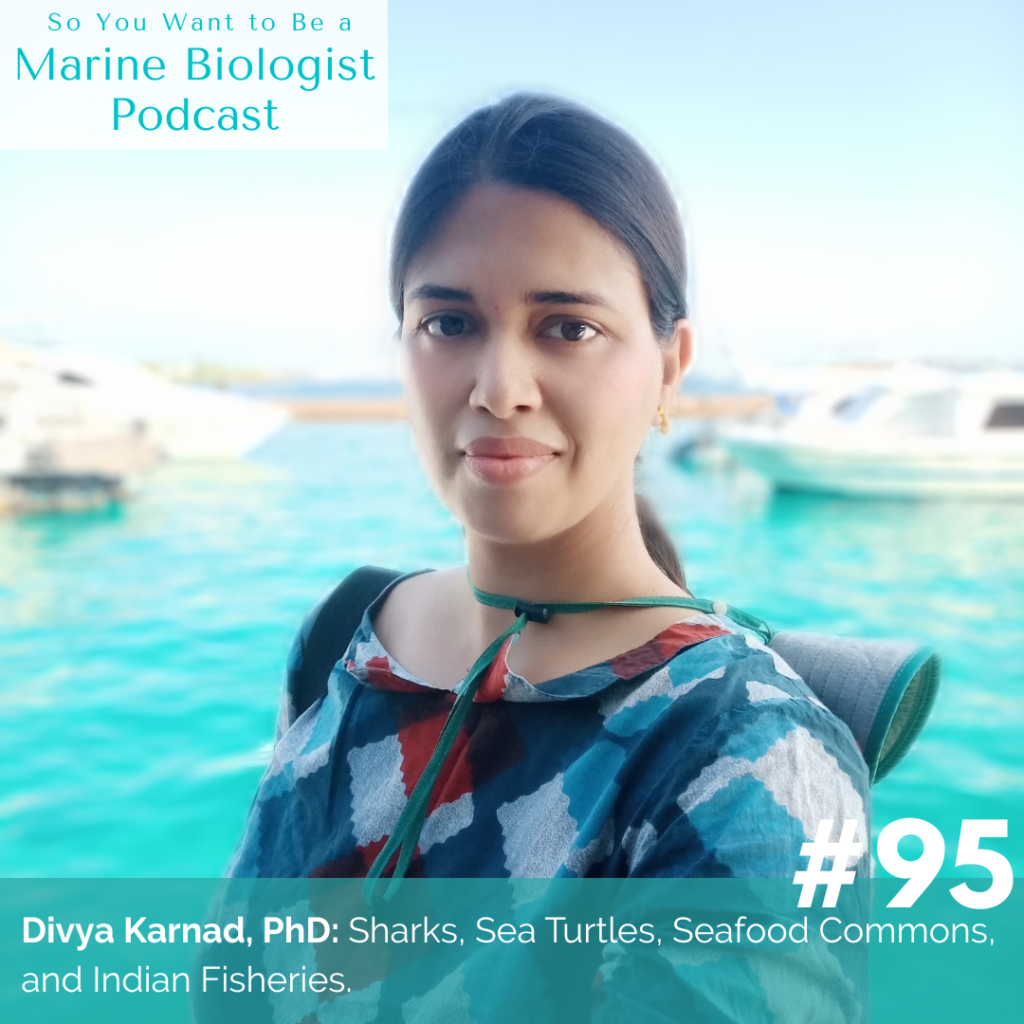Divya Karnad is an Assistant Professor of Environmental Studies at Ashoka University in India. The focus of her work is marine conservation and fisheries management. She won the global Future for Nature Award in recognition for her work with InSeason Fish, a sustainable seafood initiative that she founded. Divya is published in scientific journals like Ambio, Biological Conservation, Conservation Biology, Marine Policy and the Proceedings of the National Academy of Science and offers a unique perspective on fishing and fishing communities.
Connect with Divya: website| instagram| twitter
Quick Links
InSeasonFish
Future for Nature Award
FAO
IUCN
Indian Wildlife Protection Act
Seafood Commons
Certified Seafood
Bycatch
Bonnie McKay
Kevin St. Martin
Rutgers University
Show Notes
1:30 Divya dives in to explain that what really got her into marine science was an opportunity to volunteer with a conservation organization working with sea turtles right in her hometown within India
3:00 Divya shares how the women fisherman were her saviors through her daily travels on public transportation and individuals she is grateful to work with
4:00 She was inspired to pursue her PhD in the United States to learn different social science tactics on how to approach the topic of marine science and incorporate the fishermen into conservation within India
9:00 One of the reasons Divya pursued a PhD in the United States was she feels the United States was able to provide her the opportunity to maintain her biology identity she obtained studying marine science prior to her PhD and work with other social marine scientists like Bonnie McKay and Kevin St. Martin at Rutgers University
11:00 Divya returns to India to do her fieldwork portion of her PhD with the local fishermen who were beginning to recognize the negative impacts the ocean was facing in regards to lower fish stocks and some were accepting of Divya’s sustainable approach towards this fishery community
12:00 The fishermen were already trying sustainable approaches towards their fishing tactics such as soaking and checking their nets to see that they were capturing the fish they were targeting instead of bycatch, but did not have input from organizations like FAO.
15:00 Fisherman were complaining that the urban markets were only willing to take about 20 percent of the diverse species that were being caught in the biodiverse marine ecosystem of India, but ultimately, Divya recognized that consumers needed education on which fish to eat to promote sustainable fisheries. Listen to hear how she went about tackling this objective!
19:00 Out of all the elements she incorporated into her program for informing consumers on how to sustainably purchase fish, Divya found that the in-person tours had the most lasting impact!
22:00 Divya explains the challenges and lack of economic benefits associated with implementing certification of fisheries and compares it to the certification process of coffee within India
25:00 Divya wanted to make sure that all people on all areas of the seafood supply chain (consumers, restaurant distributors of fish, the fisherman, etc.) were aware of their impact on the fisheries within India. Everyone within the supply chain must come together to manage the fishing commons!
27:40 Divya earned the Future for Nature Award which is a global award that recognizes how the initiative for in season fish can go beyond sustainable seafood and can be used for the conservation of any threatened marine species. Now that Divya has won this award, she is receiving messages from individuals who are doing similar work and the conversation for conservation is really taking off!
31:00 Divya had an interest to focus on sharks and rays throughout this fisheries program she developed because there was a gray area between the sharks and rays that were commercially viable, those that were protected and those that were threatened species. Her goal was to help the fisheries protect and conserve these species!
32:35 There once was a culture surrounding young fishermen catching sharks and rays with a single hook and rod line, but now as technological advances have been made in the fisheries world, it is not a highly valued skill to catch them. Lower economic groups may purchase sharks and rays to eat since it is not quite as expensive, but it never became quite a popularized meal since the meat can be quite pungent.
35:53 Divya and her team have come up with solutions for conservation of species that don’t have an economic value like the critically endangered guitarfish for example, is a live release program. She and her team are working on creating incentives for fishermen to participate in this live release system
37:40 Another element to Divya’s program is that there are groups of people at local harbors, beaches and other areas within India to check what fishermen are catching and have formal interviews or informal dialogues with fisherman to understand their tactics and encourage them to fish sustainably
39:20 Divya and her team work with chefs to understand alternatives for seafood dishes that are sustainable, what pairs well with other elements of each dish and efficient cooking times
40:25 Shark Water citizen science project is another component that is not yet released to the public. The goal is for users to capture images of sharks they encounter and through the interface learn how to identify different species of sharks.
47:25 Divya wants listeners to learn that we should see fishing communities as partners in this conservation movement because their livelihoods are dependent on sustaining the livestock. She encourages listeners to talk to their local fisherman and use them as sources of information. Her second point is she wants listeners to focus on their seafood diet and understand the fish stocks that are ecologically available in the area near you!
